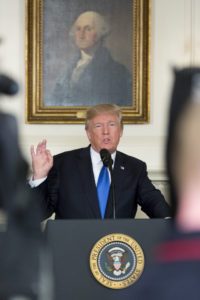
President Donald Trump delivers remarks on the Iran Strategy. (Official White House Photo by D. Myles Cullen)
United States President Donald Trump on Friday delivered a message that American allies in the Middle East have been waiting to hear: either improve the Iran nuclear deal, or cancel it altogether. “I am directing my administration to work closely with Congress and our allies to address the deal’s many serious flaws so that the Iranian regime can never threaten the world with nuclear weapons,” said Trump in comments posted to the White House website. “…However, in the event we are not able to reach a solution working with Congress and our allies, then the agreement will be terminated. It is under continuous review, and our participation can be cancelled by me, as President, at any time.”
In particular, Trump wants changes to the so-called “sunset clauses” that cut back on restrictions on Iran’s nuclear activities in coming years. The Iran nuclear accord is a controversial multilateral agreement between the major world powers and Iran that was put in place during the administration of Trump’s predecessor, former-President Barack Obama. The deal offered sanctions relief to Iran in exchange for concessions by Iran limiting their nuclear activities.
In addition to Trump’s ultimatum to fix the nuclear deal or else, he also announced plans to place “tough sanctions” on Iran’s Islamic Revolutionary Guard Corps (IRGC), the powerful government-sponsored paramilitary group that has been involved in terrorism around the world. Israel, Saudi Arabia and others in the region expressed their support for Trump’s new approach to Iran.
Israeli Prime Minister Benjamin Netanyahu on Sunday, in comments released by his office, commended Trump for “his important decision on Iran.” Said the Israeli leader, “I believe that any responsible government, and whoever seeks to promote peace and security in the world, needs to take advantage of the opportunity that President Trump’s decision has created in order to improve the agreement or abrogate it and, of course, stop Iran’s aggression.”
Supporting IRGC Sanctions
Earlier, the leader of Saudi Arabia, King Salman bin Abdulaziz Al Saud, called Trump to offer his support. The official Saudi Press Agency reported that the Saudi King on Friday welcomed Trump’s “firm strategy” towards Iran and what the report noted as Iran’s “aggressive activities and support for terrorism in the region and the world.”
A separate report from the Saudi Press Agency said Yemen also welcomed the Iran strategy, highlighting Iran’s involvement in that nation’s civil war. Ahram Online reported that Egypt’s Foreign Ministry expressed shared concern with Trump about Iranian actions in the region, without specifically commenting on the Egyptian views of Trump’s overall Iran policy.
Israel too is troubled by Iranian belligerence in the region and Netanyahu said it is “self-evident” that Trump’s intention to impose sanctions on the Revolutionary Guards “needs to be supported.”
Said Netanyahu, “The Revolutionary Guards are Iran’s main arm in spreading terror around the world and, of course, in spreading its aggression throughout the Middle East.”
In a press release posted to the White House website, the Trump Administration noted that the IRGC answers only to Iranian Supreme Leader Ali Khamenei, has sought to grow its economic power in Iran and has been involved in terror and conflict around the world.
Nuclear Deal Threat
Regarding the nuclear deal, Trump announced that he would not certify that the nuclear accord is “appropriate and proportionate” in his review to the U.S. Congress, while not outright calling for withdrawal from the international arrangement at this time. The Atlantic reported that Congress has 60 days to decide if they want to introduce legislation to again implement sanctions on Iran’s nuclear activities, which if passed would effectively remove the Americans from the multilateral agreement.
In his comments last week, Trump argued that Iran has had some technical violations of the agreement and that Iran is “not living up to the spirit of the deal.”
Said Trump, “By its own terms, the Iran Deal was supposed to contribute to ‘regional and international peace and security.’ And yet, while the United States adheres to our commitment under the deal, the Iranian regime continues to fuel conflict, terror, and turmoil throughout the Middle East and beyond.”
Trump pointed to North Korea as an example of how “the longer we ignore a threat, the worse that threat becomes.” Netanyahu offered a similar warning in highlighting the danger posed to leaving the Iranian nuclear deal as is.
“It is completely clear, if one examines this agreement, if nothing changes, that Iran will have an arsenal of nuclear weapons within a few years,” warned the Israeli leader. “This agreement does not block this. It creates a sure path to the production of an enrichment system that could quickly bring Iran to dozens of atomic bombs and even more; therefore, the [Trump] decision is very important.”
(By Joshua Spurlock, www.themideastupdate.com, October 15, 2017)
